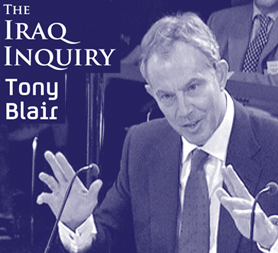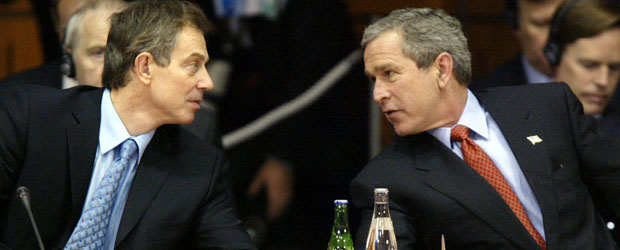Tony Blair questioned for second time at Iraq inquiry
As Tony Blair appears again at the Iraq Inquiry, Channel 4 News examines the questions likely to be on the agenda as Tony Benn insists the former PM’s secret letters to President Bush must figure.

A week short of the anniversary of his first appearance, former prime minister Tony Blair will give further evidence to the Chilcot Iraq Inquiry, answering a fresh round of questions about the decisions he made in the run-up to the US-led invasion of Iraq in 2003.
He has been asked to return to explain “discrepancies” with other acccounts following his day-long grilling on 29 January 2010.
The latest public session is again taking place at the QEII Conference Centre in Westminster, London, where the Channel 4 News Iraq Inquiry Blogger will be live tweeting from throughout Friday.
Tony Blair in January 2010: I have no regrets
A year ago Mr Blair said he was “sorry” that the war had been divisive. But he mounted a vigorous defence of the invasion, insisting he had no regrets about removing Saddam Hussein and that would do the same again.
Key questions for Blair
This time it is expected Mr Blair will be quizzed in more detail on the intelligence used to justify the invasion, asked to clarify his apparent contradiction of legal advice – revealed recently by former Attorney-General Lord Goldsmith – and to explain some of the “important” and “unique” insights said by Sir John Chilcot to be contained in the former PM’s letters to then US President George W Bush.
Tony Benn, a former Labour minister and anti-war campaigner, has told Channel 4 News: “The most important question to ask Mr Blair is this: why have you not allowed your messages or letters to George Bush to be published?”

Insubstantial intelligence
In July 2010 (six months after Blair’s first appearance) MI5‘s former chief Baroness Manningham-Buller told the Iraq inquiry in July that the intelligence used in the build up to the invasion was “not substantial enough”. She said: “If you are going to go to war, you need a pretty high threshold, to decide on that.”
Baroness Manningham-Buller also conceded that in retrospect she should have “challenged more”, adding that “arguably we gave Osama bin Laden his Iraqi jihad.”
Chilcot’s panel may push Mr Blair for a direct response to this admission from his then top security service adviser.
Ex-MI5 boss on Iraq war: ‘I should have challenged more’
What a difference a year makes
He's back. Almost exactly one year after his first appearance, Tony Blair returns to the QEII conference centre this morning to face renewed questioning by Sir John Chilcot and the Iraq Inquiry panel, writes the Channel 4 News Iraq Inquiry blogger.
And what a difference a year makes. Labour, the party whose government took the UK to war in 2003, is no longer even in power. And swathes of document releases by the anti-secrecy group Wikileaks have encouraged us to question and analyse our political leaders' actions and intents in an unprecedented way.
Perhaps it was in part the latter that encouraged the Inquiry to recently begin releasing (heavily redacted) transcripts of some of its secret hearings as well as a handful of newly-declassified documents.
Two key questions to listen for this morning. First: will Mr Blair support the declassification and release of private notes that he sent President Bush about Iraq in the run-up to hostilities? Perversely the Inquiry has seen the documents but it can't read from or publish them, and Sir John's anger with the Cabinet Office was clear earlier this week. Second: why did the former Prime Minister disregard his own Attorney General's advice on the international legality of war in early 2003? That's what Lord Goldsmith appeared to suggest in a statement released on Monday.
At the very end of his first evidence session, Sir John asked Mr Blair: "No regrets?" This, his memoirs revealed, made him feel "sick, a mixture of anger and anguish" at what he felt was a "headline question." How Mr Blair will feel at the close of today's questioning remains to be seen.
Legal advice
Lord Goldsmith has revealed in a written statement that he felt “uncomfortable” about Tony Blair’s comments that Britain could attack Iraq without further United Nations (UN) backing, when his legal advice clearly suggested the opposite.
The Attorney General told Tony Blair on 14 January 2003 there was “no room” for rejecting a veto of a resolution authorising military action by a permanent UN Security Council member on the grounds it was “unreasonable”. The following day Mr Blair told the Commons it was necessary to be able to say that Britain would still act if an unreasonable veto was put down.
Lord Goldsmith only formally presented legal advice that a “reasonable case” could be made to attack Iraq without UN support a fortnight before the invasion began in March 2003.
It is expected Blair will be freshly quizzed about these apparent contradictions.
Iraq inquiry: Blair contradicted legal advice

Bush letters
Tony Blair’s private letters to George W Bush on Iraq were considered so sensitive they were “expunged” from the official Whitehall record, it was revealed earlier this week. Cabinet Secretary Sir Gus O’Donnell has told the Iraq inquiry that their release could damage the UK’s international relations.
But Sir John Chilcot’s team may try to extract some of the details contained in these confidential notes, especially as some of the documents have been referred to in the memoirs of both Mr Blair and President Bush.
Sir John said this week: “We sought disclosure of key extracts, which illuminate Prime Minister Blair’s position at critical points. The inquiry is disappointed that the cabinet secretary was not willing to accede to its request.
“It seems to us that it is both contrary to the terms of the protocol and, in light of the disclosures in recent memoirs, unnecessary to prevent the inquiry from being able to do this.”
Tony Benn told Channel 4 News: “There are so many detailed questions: when Blair saw Bush, what he said to him, what he told his colleagues, did he listen to the Attorney General?
“All these questions if they’re brought out, and I think they will be, will confirm the judgement of many people including myself that the decision to go to war was wrong.”
Chilcot ‘disappointed’ over block on Blair’s Iraq memos
Straw memo
Former foreign secretary Jack Straw is said to have offered Tony Blair a “way out” of attacking Iraq at a secret meeting days ahead of the invasion. Mr Straw advised Mr Blair that he had a final chance to halt Britain’s involvement eight days before the war began, according to an unnamed witness.
But Mr Blair insisted he wanted to press ahead with military action. The meeting was not recorded after No 10 officials decided it was “a very personal discussion”.
Chilcot may also raise the contents of a previously secret memo from Jack Straw regarding the war.
In it, he said: “A legal justification is a necessary but far from sufficient precondition for military action.
“We also have to answer the big question – what will this action achieve? There seems to be a larger hole in this than on anything.”
Photo gallery – images from the Iraq war
Your Twitter questions for Tony Blair
lukejcr had he known the war was at risk of being deemed illegal, would he have still gone ahead?
schloss_webb Mr. Blair, were you present or did you know in advance, that Dr. Kelly was being named? #iraqinquiry
Lescromps Ask Blair if he was offered any financial considerations if he backed Bush Cheney and the rest of the oxygen thieves #askblair
CarlLoben Tony Blair: ironic that you're now Middle East Peace Envoy, eh? How do you sleep at night
TonyDowling I would like to know why Blair spent so long trying to get a 2nd UN resolution if it wasn't needed?
Andrew_Withers What were the war aims and did you have an exit strategy, what legal justification was there for invading a sovereign state miketoons @channel4news #iraqinquiry Do you know exactly how many people have lost their lives (or had their lives ruined) since the US/UK invasion?
failtosucceed Why his version of events is incompatible with everyone else's.
Follow Blair at the Iraq inquiry on Friday via @channel4news, @IraqInquiryBlog and on Facebook/Channel4News